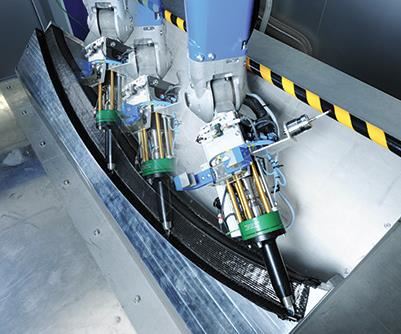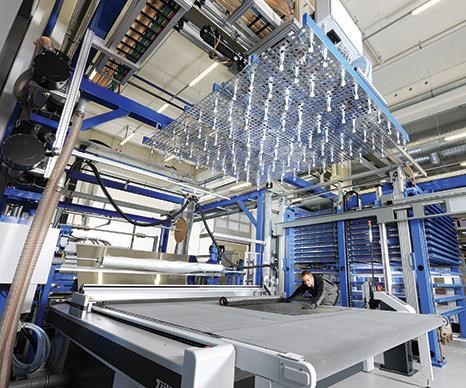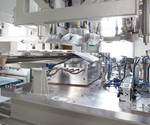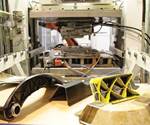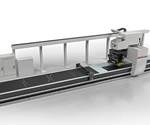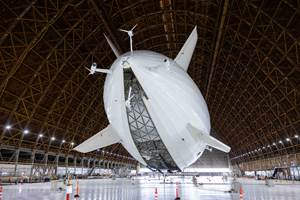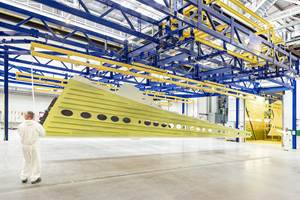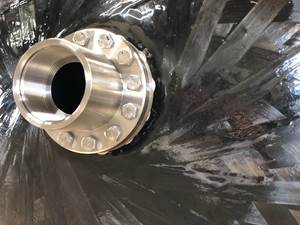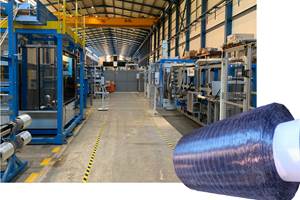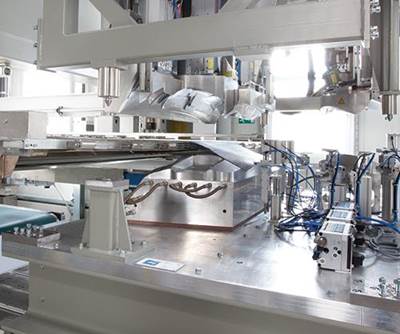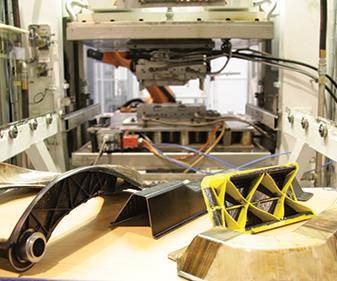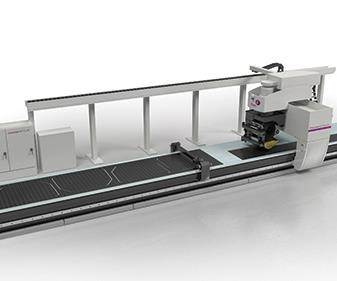Turnkey manufacturing systems: Automated RTM for aerospace
German Aerospace Center’s (DLR) Center for Lightweight Production Technology site in Stade, Germany, has developed EVo, an automated production line capable of 100,000 complex composite parts/yr.
The German Aerospace Center’s (DLR) Center for Lightweight Production Technology site in Stade, Germany, focuses on the automated production of carbon fiber-reinforced plastic (CFRP) structures for the aerospace, transportation and energy sectors via its Center for Lightweight Production Technology at two main research sites: Augsburg and Stade. The latter has developed EVo, an automated production line capable of 100,000 complex composite parts/yr, to serve as a development tool, simulating a realistic production environment to test different materials, process parameters and automation concepts.
“EVo was originally designed to make aircraft frames and stringers,” explains net shape RTM team manager Sven Torstrick. “We started in 2009, the same time BMW was scaling up CFRP to mass production, but also when the next Airbus A320 was being envisaged in CFRP.” He says the obstacle was how to build 500 aircraft/yr using hand layup prepreg. “For 200 fuselage frames per aircraft and 500 aircraft/yr, that’s 100,000 frames/yr. So you need an automated process line.”
Torstrick’s group initially tried to source a single integrated line from one supplier, but eventually split the line into 6 separate parts for bid: ply preparation, preforming, fine trimming, RTM, oven and software. “We found a supplier that could work with all of the other suppliers and develop a standard for how all the units would talk to each other,” Torstrick points out. “They made the master command module, which creates the process recipes, monitors the process, and controls start and stop functions.”
The ply preparation module handles the textile rolls and sends them to the automated cutter, where different materials and ply orientations are prepared per digital cutting files. The cut plies are then stored in a shelf system where a robot picks and places them onto a transfer table that interfaces with the preform area. “We need to know where the plies are located on the transfer table,” says Torstrick, “so we have a roof-mounted camera system that feeds this information to a robot. The robot can then pick up the ply and drape it onto the part.”
The next module uses a vacuum membrane press to consolidate the stacked plies, applying air pressure above the membrane and evacuating air from below the stack while the powdered epoxy binder on the material is activated using infrared (IR) heating. The resulting preform is now stable for robotic handling through the trimming process.
The “fine trimming” module trims the stabilized preform to net shape and reportedly makes EVo a more robust process. Torstrick explains this prevents resin running around the preform, which could lead to dry spots. He also notes there must be no open edges for aircraft composite parts. “Milling a cured part can expose fibers to moisture intrusion and create microcracks in the resin. All of the edges would then have to be sealed and the part placed back in the autoclave.”
A robot places the net-shape preform into the 4-part RTM mold — outer mold with all heating channels and inner/core molds where the preform is placed. The core mold is closed and the whole package is placed into the RTM press. “All frames look alike but are actually different geometries, so we needed to process many different parts per shipset,” says Torstrick. “We must also use RTM 6 resin, which needs a cure time of 90 minutes or more, so we insert the preform into the mold, move the mold into the press and then to the oven for post-cure.” Thus, EVo can inject and cure different parts immediately after each other.
The first part being trialed is a 2m long V-shaped curved profile aircraft frame with variable thickness and curvature radius over its length. “There is no actual part like this,” explains Torstrick, “but we collected all of the potential issues and put them together in one part that we call ‘Frankenframe.” The EVo line can handle parts 2.5m by 2m by 40 cm in height, with a target time between two aircraft parts of 30-40 minutes. Torstrick says this could be significantly reduced with faster resins. “We could also accommodate automotive rooftops, and by modifying the fine trimming area to include a foam-milling operation, we could make sandwich parts and also use the membrane press as a press-clave to cure parts.”
This short article is a Side Story to a feature article titled "Turnkey manufacturing systems: Materials, markets & maturation."
Related Content
Next-generation airship design enabled by modern composites
LTA Research’s proof-of-concept Pathfinder 1 modernizes a fully rigid airship design with a largely carbon fiber composite frame. R&D has already begun on higher volume, more automated manufacturing for the future.
Read MorePlant tour: Spirit AeroSystems, Belfast, Northern Ireland, U.K.
Purpose-built facility employs resin transfer infusion (RTI) and assembly technology to manufacture today’s composite A220 wings, and prepares for future new programs and production ramp-ups.
Read MoreInfinite Composites: Type V tanks for space, hydrogen, automotive and more
After a decade of proving its linerless, weight-saving composite tanks with NASA and more than 30 aerospace companies, this CryoSphere pioneer is scaling for growth in commercial space and sustainable transportation on Earth.
Read MoreNovel dry tape for liquid molded composites
MTorres seeks to enable next-gen aircraft and open new markets for composites with low-cost, high-permeability tapes and versatile, high-speed production lines.
Read MoreRead Next
Turnkey manufacturing systems: Simplifying automated HP-RTM
Having offered turnkey systems for composites since the 1990s for sheet molding compound (SMC), long fiber thermoplastic (LFT) and glass mat thermoplastic (GMT), Dieffenbacher (Eppingen, Germany) now has automated systems for high-pressure resin transfer molding (HP-RTM).
Read MoreTurnkey manufacturing systems: Part-per-minute thermoplastic composites
Pinette Emidecau Industries’ (PEI, Chalon-sur-Saône, France) leads a consortium of providers that are collaborating on the Quilted Stratum Process (QSP), a means to accelerate thermoplastic composites processing in the auto industry.
Read MoreTurnkey manufacturing systems: Aiming for automotive-industry volume production
Fives Cincinnati (Hebron, KY, US) has announced an integrated manufacturing system for automotive composites comprising two automated manufacturing cells.
Read More

